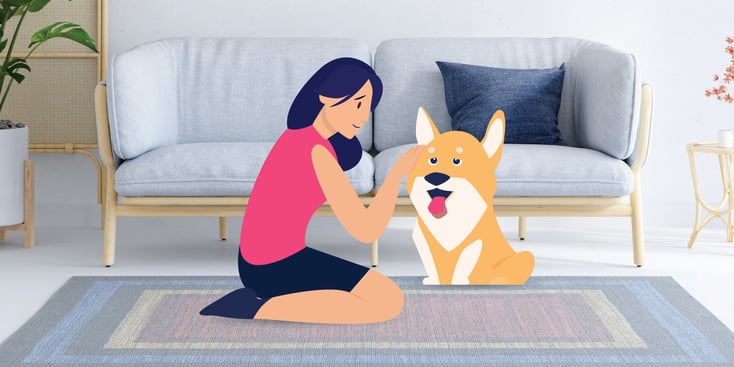How to Calm a Panting Dog: 9 Easy Tips

Table of Contents
When your dog is panting excessively, it's more than just a sign of them being a little out of breath - it's a cry for help. They're relying on you to understand their distress and provide the comfort and care they need. Whether it's anxiety, heat, or something else causing their discomfort, there are several ways you can help your furry friend find their calm again.
Discover effective techniques to keep your canine friend calm and comfortable. Let's get started!
1. Keep Close Company
Staying near your dog can be calming when they're panting due to anxiety.
2. Cool Them Down
If your dog is panting a little due to the heat, it’s worth quickly cooling them down before they get heatstroke. Allowing them to cool off in a river, stream, or paddling pool or using cool water from a hose or shower should help.
You can also use ice cubes or even freeze their toys in a container of water to give them a fun activity that keeps them busy and cool at the same time!
Related article: 11 Ways to Keep Dogs Cool During the Summer
3. Find Some Shade
If your dog might be panting because they are hot, it's best to find some shade or take them inside somewhere cool. Dogs can’t lose heat very easily, so getting them out of the sun should help quickly.
Related article: Summer Pet Safety Tips From a Veterinarian
4. Offer Them a Drink
Offering your dog some refreshing water will keep them cool and hydrated in the warm weather and should help if she is panting because they are hot. Adding flavors like meat juices or low-salt stock can help to encourage your furry friend to drink.
5. Find Somewhere Calm
If your dog might be panting because they are stressed or anxious, you should try taking them somewhere calm, away from any people, noise, or the hustle and bustle. Calming diffusers, collars, and sprays might also help create a calming environment for your stressed pooch to chill.
6. Try Pheromone Therapy
Appeasing pheromones, which mimic the natural calming scent of a nursing female dog, are available in sprays and diffusers at pet stores.
7. Apply an Anti-Anxiety Garment
Wrapping your dog in a garment that applies gentle pressure to the body can mimic the feeling of being held and may ease anxiety.
8. Give Your Dog Supplements
Certain supplements, such as those containing L-theanine, valerian, chamomile, or milk proteins, may help lower cortisol levels and ease stress in dogs. Consult with your veterinarian first before providing them with these supplements.
9. Seek Veterinary Advice
If your panting pooch doesn’t start to calm down or has developed any other symptoms, you should contact your veterinarian for advice. Your veterinarian will be able to examine them and do any necessary tests to find out the reason behind the panting.
Conclusion
It’s not always easy to calm a panting dog, and some causes of dog panting can be serious. Therefore, if your dog doesn’t calm down soon after being cooled and taken somewhere calm and quiet, you should schedule a veterinarian visit. Your veterinarian will be able to find the underlying reason and support you in getting your pooch to feel better soon.
Frequently Asked Questions
Why do dogs pant?
Dogs pant for many reasons, including when they're hot, excited, or stressed. Panting is a common behavior in dogs and can be a sign of anxiety or stress. If you notice your dog panting excessively, it's essential to address the underlying cause and consult with a veterinarian to ensure your dog receives appropriate treatment.
Find some tips for introducing your dog to your new baby, and your veterinarian will be able to help with any concerns you have too.
However, panting can also indicate a medical issue, like pain, breathing distress, or feeling unwell. For example, it’s common for arthritic dogs to pant if their legs feel sore and stiff or if a dog has a painful ear infection or another source of pain.
How do you know if your dog’s panting is normal or excessive?
Excessive panting in dogs can be a cause for concern. To determine if it's a problem, consider the context in which your dog is panting. If the situation wouldn't normally lead to panting, such as cool weather or resting, it may indicate an issue.
Additionally, observe if your dog has other symptoms or behaviors that suggest an underlying health condition or stress, like increased thirst, vomiting, or anxiety.
If the panting persists in unexplained situations and doesn't subside after a few minutes, it can be considered excessive panting.
How do you calm a stressed dog panting?
How to calm a panting dog depends on what the cause is. If you're sure that your dog is panting because they are stressed, you should try to identify the cause of the stress. It might be another dog, loud noises like fireworks or thunder, or perhaps they may have separation anxiety.
Once you know the reason, you should take them away from whatever is stressing them to somewhere calm and quiet. Long-term behavior issues like noise phobias and separation anxiety might need the input of a veterinary behaviorist.
How to calm a dog panting at night?
To calm dog panting at night, create a comfortable sleeping environment. Ensure good ventilation and a cool temperature. Provide a cozy bed and use calming techniques such as soothing music, aromatherapy, or a comforting blanket. Establish a bedtime routine and engage in relaxing activities before sleep.
Why is my dog panting so much while resting?
If your dog is panting while resting, they could be hot, in pain, anxious, or feeling unwell. If they have other symptoms like drinking or eating more or peeing more, they might have Cushing’s disease. Your veterinarian will be able to help you determine the cause of the panting and give advice on how to treat or manage it.
Why is my dog panting excessively for no good reason?
Dogs can pant excessively for many reasons, including heat, exertion, pain, stress, and certain medical conditions. If you think your dog might be panting excessively, you should speak to your veterinarian.






